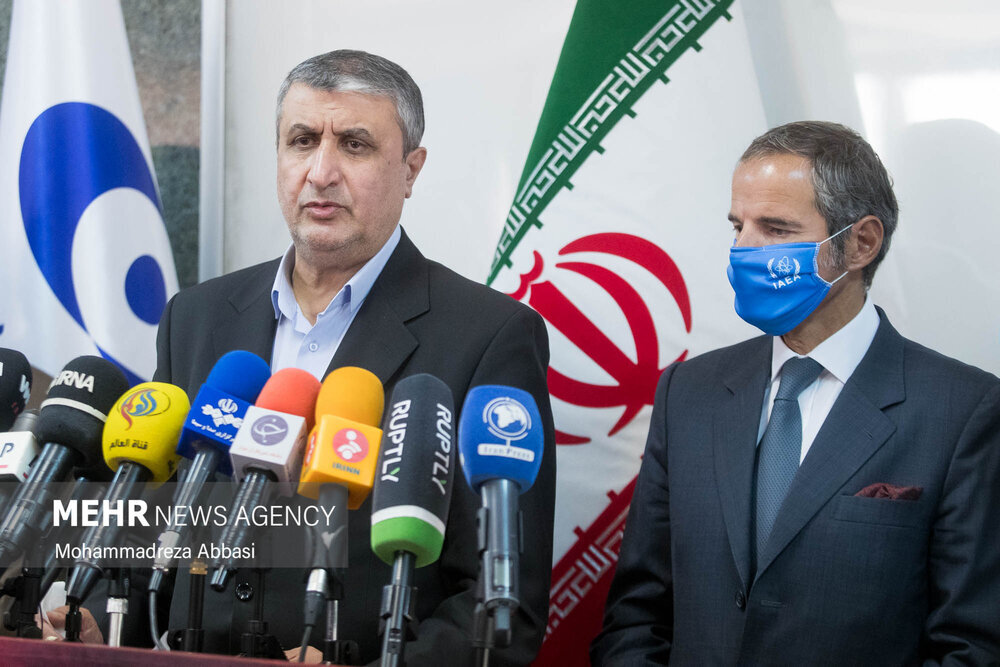Iran calls talks with IAEA director constructive

TEHRAN - The new chief of the Atomic Energy Organization of Iran (AEOI) Mohammad Eslami on Sunday described his talks with IAEA Director General Rafael Grossi as “good and constructive”.
"Mr. Rafael Grossi came to Tehran at the invitation of the Atomic Energy Organization of Iran and we had good and constructive talks with him," Mohammad Eslami made the remarks in a joint press conference with Grossi.
Eslami also said he will hold talks with Grossi on the sidelines of the International Atomic Energy Agency’s Board Governors which will start in Vienna from Monday.
"We decided to participate in the next meeting and continue our talks on the sidelines of the meeting," Iran’s new nuclear chief stated.
Eslami added, "The spirit governing the negotiations is to create opportunities for the development of interactions, cooperation within the framework of the rules and regulations of the International Atomic Energy Agency."
Stating that all issues between Iran and the IAEA are basically technical and that political issues have no place in relations between the two sides, Iran’s nuclear chief said: "We decided to participate in the next meeting and continue our talks on the sidelines of the meeting."
Grossi to visit Iran again in the near future
Eslami also said, "We have agreed that Mr. Grossi will visit Tehran again in the near future."
"It was also decided that the experts of the Agency would come to Iran to replace the memory cards of the technical surveillance cameras and take the necessary technical measures for the cameras. And the memory card is sealed according to the routine in Iran and stored there, and new cards are installed."
Eslami, who is also vice president, highlighted, "What is important to us and what the Agency is emphasizing is to build trust".
"Mutual trust between the Islamic Republic and the Agency must be maintained, and the Agency must play a significant role in fulfilling its legal obligations to advance Iran's nuclear energy," Eslami stressed.
In a telephone conversation with European Council President Charles Michel on Wednesday, Iranian President Ebrahim Raisi said that taking an unconstructive approach towards the Iran nuclear deal by the IAEA would undermine the path of the nuclear negotiations in Vienna.
Also, Iran’s Foreign Ministry spokesman Saeed Khatibzadeh warned on Monday that political exploitation of the UN nuclear watchdog would entail a different response from Iran and no side should “miscalculate”.
Speaking to reporters in his weekly press conference, Khatibzadeh said that the next meeting of the IAEA’s Board of Governors is a usual one.
He described the relationship between Iran and the IAEA as technical and respectful and hoped that no one would interfere in this relationship.
Iran's Ambassador and Permanent Representative to Vienna-based International Organizations Kazem Gharibabadi stated that the IAEA had to maintain its neutrality and professionalism.
Gharibabadi told reporters on Tuesday that all Iran's nuclear activities, including uranium enrichment at various levels, were carried out within the framework of Iran's nuclear rights under the Non-Proliferation Treaty based on Iran's safeguard obligations.
The IAEA has been tasked to monitor Iran’s nuclear program based on the 2015 nuclear deal – JCPOA - according to which Iran agreed to put limits on its nuclear activities in exchange for termination of economic and financial sanctions.
However, Iran gradually removed caps on its nuclear activities as the U.S. quit the nuclear deal in May 2018 and imposed the harshest sanctions in history against Iran. Iran decided to remove bans one year after the U.S. left the agreement and the European parties to the agreement did nothing to compensate Iran for the sanctions.
Gharibabadi said since the other parties have not fulfilled their JCPOA obligations in lifting sanctions, and the U.S. policy of imposing illegal and unilateral sanctions on Iran still goes on, no one can pressure Tehran to halt its nuclear activities.
Leave a Comment